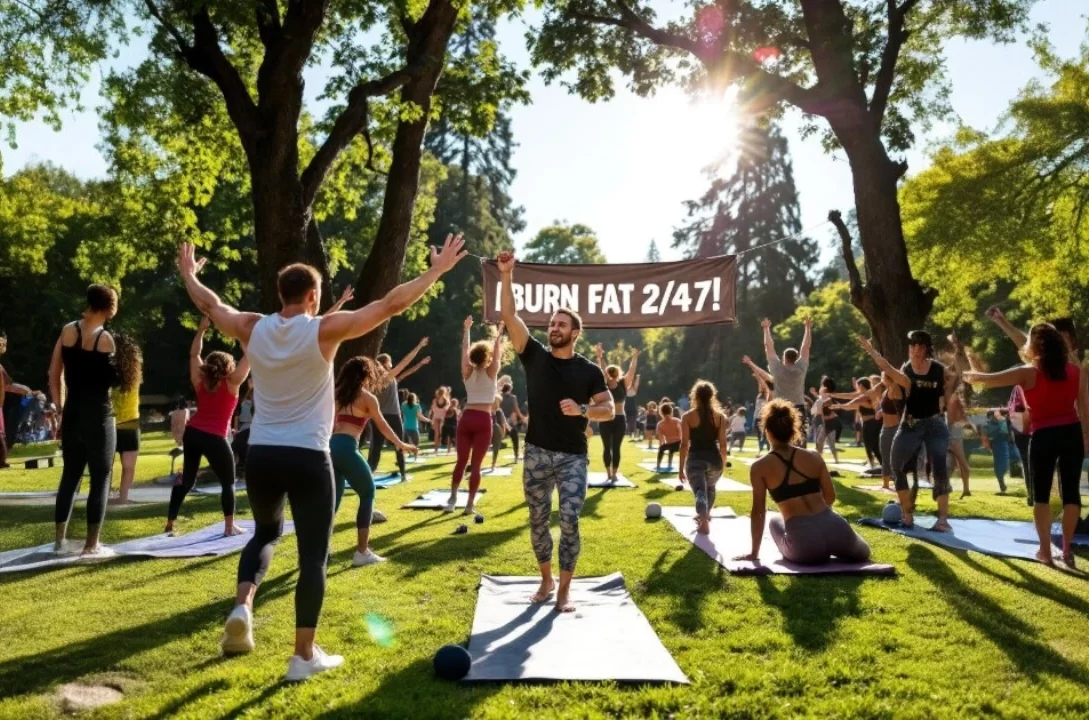Why 24/7 Fat Burn Is Possible
Imagine burning fat not just while exercising, but while working, sleeping, and even relaxing. It sounds like a dream, but with the right techniques, it’s absolutely achievable. By boosting your metabolism and triggering certain physiological responses, you can unlock round-the-clock fat loss.
Understanding Fat Burning vs. Weight Loss
Fat burning is about reducing body fat percentage. Weight loss may include water, muscle, and fat. The goal? Focus on fat, not just the scale.
- Weight loss: Can be misleading
- Fat loss: Sustainable, health-driven goal
The Science Behind EPOC (Excess Post-Exercise Oxygen Consumption)
EPOC refers to the increased calorie burn after intense exercise. Your body uses more oxygen post-workout to restore itself—this burns extra calories for hours.
Key benefits:
- Burns fat after exercise ends
- Boosts metabolism
- Linked to intense workouts like HIIT and resistance training
High-Intensity Interval Training (HIIT): The Fat Torch
HIIT alternates bursts of intense activity with short rest. It’s efficient and keeps your body burning fat long after you finish.
Example HIIT workout:
- 30 sec sprint + 90 sec walk (Repeat 8–10 times)
Benefits:
- Maximizes EPOC
- Preserves lean muscle
- Torches calories quickly
LSI Keywords: interval training, calorie burn, metabolic boost
Strength Training: Build Muscle, Burn More Fat
Muscle is metabolically active. The more muscle you have, the more calories you burn—even at rest.
Effective techniques:
- Compound lifts (squats, deadlifts)
- Progressive overload
- Full-body workouts 3x/week
Why it works:
- Increases resting metabolic rate (RMR)
- Enhances insulin sensitivity
- Reduces body fat percentage
Metabolic Conditioning: Supercharge Your Workouts
Metabolic conditioning (MetCon) workouts combine strength and cardio. They push your heart rate and muscles to the limit.
Example MetCon routine:
- 5 rounds: 15 kettlebell swings, 10 push-ups, 20 jump squats
Why it’s powerful:
- Builds endurance and strength
- Maximizes calorie expenditure
- Boosts fat oxidation
NEAT (Non-Exercise Activity Thermogenesis): The Hidden Hero
NEAT includes all calories burned outside structured exercise—walking, cleaning, fidgeting, standing.
Tips to increase NEAT:
- Take the stairs
- Walk after meals
- Use a standing desk
Why NEAT matters:
- Accounts for a large part of daily calorie burn
- Easy to incorporate
- Encourages consistent movement
Morning Fasted Workouts: A Fat-Burning Kickstart
Exercising before eating may promote more fat oxidation, especially low-intensity cardio.
Example:
- 30-minute brisk walk or light jog before breakfast
Benefits:
- Improves insulin sensitivity
- Mobilizes stored fat
- Enhances metabolic flexibility
Active Recovery and Sleep: Maximize Fat Burn While You Rest
Recovery is when your body rebuilds and burns fat. Poor sleep sabotages fat loss by increasing cortisol and hunger hormones.
Recovery strategies:
- Light yoga
- Foam rolling
- 7–9 hours of quality sleep
Tips for better sleep:
- No screens 1 hour before bed
- Keep a consistent sleep schedule
Nutrition Strategies to Support 24/7 Fat Burn
You can’t out-train a poor diet. Nutrition fuels your metabolism and recovery.
Key principles:
- Eat enough protein (0.8–1g/lb body weight)
- Include healthy fats (avocados, nuts, olive oil)
- Time carbs around workouts for energy and recovery
Top fat-burning foods:
- Green tea
- Chili peppers (capsaicin)
- Lean protein (chicken, fish, tofu)
Lifestyle Hacks to Keep the Fat Furnace On
Boost your metabolism outside the gym with smart habits.
Try these:
- Cold exposure (cold showers)
- Stay hydrated
- Manage stress through breathwork or meditation
Why it works:
- Activates brown fat
- Lowers cortisol
- Supports hormonal balance
Conclusion: Your 24/7 Fat-Burning Blueprint
You don’t need to live in the gym to burn fat all day. By integrating smart workout strategies, eating right, and adjusting daily habits, you can shift your body into a fat-burning machine.
Action steps:
- Start with HIIT 2x/week
- Add full-body strength training
- Increase NEAT with small lifestyle tweaks
- Sleep like your fat loss depends on it—because it does
Commit to consistency, and results will follow.
FAQs
Q1: Can I really burn fat while sleeping?
Yes! With enough muscle mass and proper recovery, your metabolism stays elevated at night.
Q2: Is fasted cardio better for fat loss?
It can increase fat oxidation, especially in the morning. But overall calorie balance is key.
Q3: How long should HIIT sessions last?
15–30 minutes is ideal. Quality matters more than duration.
Q4: Do I need supplements to burn fat 24/7?
No. Whole foods, smart training, and recovery are more effective. Some supplements like caffeine or green tea extract may help slightly.
Q5: What’s the #1 mistake people make when trying to burn fat?
Overtraining without recovery. Your body needs rest to adapt, grow, and burn fat efficiently.
Internal Links:
The Truth About Metabolism and Fat Loss
HIIT Workouts for Beginners
External Links:
Harvard Health – Exercise and Metabolism
CDC – Physical Activity Basics















